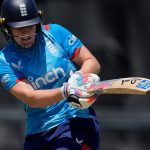Fears are also growing over a superspreader event after a man who tested positive to the virus in Melbourne’s north had a “high viral load”.Acting Premier James Merlino confirmed the new case – a man in his 60s – on Tuesday morning who health authorities had linked to the Whittlesea outbreak in Melbourne’s northern suburbs.“He was identified as a contact from case number one and was urgently tested, producing the positive result,” Mr Merlino said.“He is isolating as are his household contacts.”The fifth case has also prompted the reintroduction of Covid restrictions.From 6pm on Tuesday, private gatherings in the home will be limited to five visitors a day, while public gatherings will be limited to 30 people.The new restrictions, which will apply across Greater Melbourne, also require everyone aged 12 years and older to wear face masks indoors.It comes on top of the four new local cases previously revealed at a press conference on Monday afternoon.Health authorities also confirmed no new cases in hotel quarantine, and 14,892 tests in the past 24 hours.The new cases announced on Monday were a man in his 30s, a man in his 70s, a woman in her 70s and a preschool-aged child all from the same family but spread across three households.Mr Merlino said the genomic sequencing results for the outbreak had confirmed it was “closely linked” to the Wollert case that originated in South Australian hotel quarantine.He said the man in his 60s reported developing symptoms before first case in the outbreak, so it could be the missing link to connected the outbreak.“This could be a possible source case but a full investigation and interview process is under way and has to run its course,” Mr Merlino said.Chief health officer Brett Sutton said it’s might be the “missing link” but his movements still did not overlap with any of the exposure sites from the Wollert case.“His initial recollections do not overlap with any of the Wollert exposure sites, so there is no definitive link to the Wollert sites even though we know there is a genomic link,” he said.Professor Sutton said the new case had an appointment with the first case, the man in his 30s, and the transmission probably occurred on May 18.Professor Sutton said one of the new cases was likely “quite infectious” and Victorians needed to prepare themselves for more positive cases.“The viral load was likely high and with close contacts becoming positive he’s likely to be quite infectious,” he said.“We have to ready ourselves for any other positives and when there are close contacts that become positive it raises the possibility that even casual contacts could become positive.”Health Minister Martin Foley previously said the “working thesis” at the moment was they were connected to the Wollert man who returned from hotel quarantine in South Australia as the family also lived in the Whittlesea area.The health department has listed new public exposure sites on their website and those with any symptoms, such as fever, cough, sore throat, runny nose, chills or sweats or a change in sense of smell or taste, have been urged to get tested immediately.Testing sites have also increased their opening hours to cope with the high demand.AUSSIE DRUGS BREAKTHROUGH IN COVID FIGHTAustralian researchers have made a Covid breakthrough developing two new drugs to prevent the SARS-CoV-2 infection and to treat people exposed to it.The peptide drugs, founded by scientists from the Brisbane-based QIMR Berghofer Medical Research Institute, target how human cells respond to the SARS-CoV-2 virus, instead of the virus itself.The first peptide-based drug would be given pre-exposure to the virus and help boost the efficacy of vaccines, while the second drug would stop the spread of the virus in already infected cells.Early results are promising showing they are not toxic and have few side effects.The drugs are also stable and can be stored at room temperature, which would make them easy to distribute.The discovery was made possible after the researchers uncovered a previously unknown mode of entry that SARS-CoV-2 exploits to invade cells and cause Covid-19.Laboratory tests show the first peptide-based drug reduces infection by cloaking the ACE2 receptor protein on human cells. The SARS-CoV-2 spike protein uses the ACE2 receptor to bind to and invade cells.The virus then latches onto the cloaking peptides, which they mistake for human cells – preventing infection.The lab tests have also shown that if the virus finds its way into cells, the second peptide-drug can block how the virus hijacks the host cell and replicates. It also boosts the immune system’s ability to recognise the virus.Senior researcher and head of QIMR Berghofer’s Gene Regulation and Translational Medicine Group, Professor Sudha Rao, said they were able to develop the drugs after discovering that some people have a chemical tag which acts like a padlock on the ACE2 receptor.“The tag can either keep the receptor locked or open – controlling infection. This means people who have the ‘padlock-like’ tag on their ACE2 receptors will be less susceptible to SARS-CoV-2 and those without the tag are more vulnerable to infection,” Professor Rao said.“Our drugs stop the tag from being removed and also protect the untagged ACE2 receptors from being infected.”The researchers also discovered that if the virus invaded the cells it would unlock the tag from the inside – allowing more efficient virus replication.“Our new peptide-based drugs can keep the padlock closed and prevent infection taking hold,” Professor Rao said.“These are the first drugs we are aware of that can operate on dual fronts. We hope, if the clinical trials are successful, that the first drug could be given as a therapy alongside vaccination to prevent the virus binding to cells and taking hold, while the second peptide could be used to stop the virus replicating in already-infected patients.”The research was conducted on Covid-19 patient blood and human cells.Professor Rao said these drugs could also be very important because they may provide the protection we need for emerging variants and be used to protect the small group of people who cannot be vaccinated.VIC CASES RISE AMID BLOOD CLOT FEARSThe number of coronavirus cases detected in Melbourne have risen to four, after health authorities uncovered two “likely” positive infections earlier on Monday.The four new cases are two men, a woman and a preschool-aged child who are all relatives from Whittlesea and live across two households.The first case was symptomatic from May 20.Victorian health minister Martin Foley urged Melburnians not to be complacent after the first two cases were uncovered.“We all have our role to play here, to step up,” he said on Friday.The department said a full investigation was underway into the results, and initial public health actions were being put in place while all individuals isolated.At least two cases are known to each other and are isolating.It came after Victoria’s chief health officer Brett Sutton issued a warning last week about a “worrying” situation in Melbourne’s northern suburbs.Traces of Covid-19 were detected in wastewater in Epping and Wollert, almost three weeks after the city reported the positive Covid case from a man who flew in from India.The man, who lives in Wollert, caught coronavirus while carrying out hotel quarantine in South Australia before flying to Melbourne.This led to them realising they had missed Woolworths’ Epping North supermarket as an exposure site.It is located at the corner of Epping Road and Lyndarum Drive and the man went there from 5.40pm to 6.38pm on May 8.The original exposure site – which was an error – was Woolworths Epping, at the corner of Cooper and High Streets, which is adjacent to other exposure sites.On Friday Professor Sutton warned anyone experiencing symptoms to get tested.“This detection (in wastewater) is of note because there are public exposure sites in the area relating to the Wollert case, who has been isolating in a health hotel outside the catchment,” he said.“Out of an abundance of caution, anyone who has been to any exposure sites has to get tested and isolate.”It came as two Australians remain in hospital with blood clots following the AstraZeneca jab.Chief Medical Officer Paul Kelly said there have been 25 blood clot cases linked to vaccines across the country, including one death.“All the others have gone home, they responded to the treatment and it’s really testament to the information that has gone out to all doctors and to people that are having the vaccine about what symptoms to watch out for, to get looked at quickly to be diagnosed properly, and to be treated properly,” chief medical officer Paul Kelly said.BRANSON BLASTS AUSTRALIA Business mogul Sir Richard Branson has criticised Australia for its slow Covid vaccine rollout, saying given it’s a small country everyone should have been jabbed by now.Speaking to the Today show hosts, the Virgin founder was asked about opening up to the rest of the world in mid-2022.“That’s up to our Prime Minister,” he said.“Countries that have got everyone vaccinated, liked Britain and America … (and) especially when you have all the vulnerable people vaccinated, they can open up right away.”Sir Richard said he was in New Mexico with “lots of people” who are all hugging and shaking hands because “we’re all vaccinated”.“It’s a lovely, (a) lovely feeling to be free again,” he said.“If your government can speed up the vaccination program so everyone is vaccinated, there’s no reason at all why you shouldn’t be able to open up.”When asked whether Australia risks being left behind, Sir Richard said he anticipated most Australians should have been vaccinated by now.“It’s a small country, I suspect most people should have been vaccinated. If not, (they) should have been,” he said.“It should be the number one priority of the government. Nothing else matters because every single business in Australia will be held back.“Every single person in Australia will be held back. The economy will suffer.”Sir Richard defended Virgin Australia CEO Jayne Hrdlicka over her controversial comments that borders should reopen even if it resulted in “some deaths”.“I think we’ve all regretted things we’ve said. And I don’t think Jane is any exception to the rule. She’s made that clear. She’s doing a great job in keeping Virgin Australia going,” he said.PM’S PLAN FOR NATIONAL VACCINE PASSPORT Prime Minister Scott Morrison is set to present a draft proposal to next week’s national cabinet meeting that would allow vaccinated Australians to travel between states in the event of Covid-19 lockdowns.Federal and state departments have been working on a vaccine record plan to deal with the movement of vaccinated Australians when border restrictions are suddenly imposed, ensuring people are not left stranded, The Australian reports.State leaders have recently questioned the timing and effectiveness of an internal vaccine passport. But the Morrison Government has said the move does not amount to one, and instead is a practical measure where a vaccinated individual would not need to apply for an entry pass to travel between states impacted by COVID-19 restrictions.NEW VACCINE PLEDGE AS PFIZER SUPPLIES SET FOR BOOSTA significant increase in supplies of the Pfizer vaccine could allow every Australian to be fully immunised against Covid-19 by the end of the year, the Australian Medical Association (AMA) boss has said.The federal government has promised two million Pfizer doses would be available each week from the start of October, meaning every Australian who wants to get the jab could have both doses by the end of December.Federal health Minister Greg Hunt said approximately 4.5 million Pfizer doses were expected in Australia by the end of June, increasing to seven million doses of Pfizer in both the third and fourth quarters of 2021.“Pfizer (will supply) 40 million vaccines (to Australia), heavily weighted towards the last quarter (and) subject to supply,” Mr Hunt told media on Sunday.“They will be made available on a whole population basis.”Mr Hunt hoped the bolstered Pfizer supplies would allay fears for those aged over 50 and who were eligible, but hesitant, to receive the AstraZeneca vaccine due to rare cases of a serious blood clotting disorder.“Do not wait to get vaccinated. If you are in a qualifying group, please come forward now,” he also said on Sunday.The government’s sluggish rollout forced international travel to be pushed back to mid-2022, a grim revelation in the federal budget released earlier this month.But AMA president, Dr Omar Khorshid, said the increased supplies were a timely boost, especially while Australians had a degree of vaccine hesitancy.“Yeah it’s great news for the overall vaccine program and Australia’s chances of seeing out this pandemic,” Dr Khorshid told NCA NewsWire.“We should now have every opportunity to vaccinate every Australian by the end of the year.”Dr Khorshid said another significant breakthrough was the European drug regulator last week revising its advice on storage of the Pfizer vaccine.It was previously thought the Pfizer, after it had thawed from freezer transportation, could only be stored in a fridge for five days. However, the European Medicines Agency (EMA) said Pfizer vials could now be stored in a fridge for up to a month.“That will make a huge difference; it was a massive logistical challenge previously because we just didn’t have the capacity to distribute Pfizer vaccines and then only be able to store them for five days,” he said.Currently, almost 3.5 million Australians had received at least their first dose of a Covid-19 vaccine.Dr Khorshid said fully vaccinating every Australian before 2022 would be a tall order but still achievable.“It’s going to be a big challenge; maintaining a supply of 2 million doses a week is an awful lot of vaccines,” he said. “It’s a much bigger challenge than what we’re doing at the moment. We’ve got around 10 million Australians under the age of 50; that’s 20 million doses for the big final phase of the rollout – as well as any leftover Australians from phases 1a, 1b and 2a.“But we can do it. We’d be keen to see a big push from government to convince hesitant Australians to get out and get their vaccines and hopefully put this pandemic in our rear view.”GPS FRUSTRATED OVER JAB ROLLOUT Australian GPs are walking away from the nation’s Covid-19 vaccination rollout, “frustrated” at the lack of supply and challenges of managing constant changes to the program.Dr Karen Price, president of the Royal Australian College of General Practitioners (RACGP), said she was not sure whether media reports of 200 GPs leaving the program were correct, but she knew some had already left.The RACGP revealed in February this year that more than 4600 general practices had been approved to administer the vaccines. According to a statement released to the media on Friday by the Federal Department of Health, 4398 GPs were actually providing vaccination services.Dr Price told News Corp that doctors were frustrated by the load of having to “manage constant changes” to the vaccination program, as well as supply issues and negative media surrounding the safety of the vaccines.“The program has been frustrating and challenging because of supply issues and negative media and big success with Covid,” she said.She said Australia was not seeing the high infection rates and deaths that other countries were – and in these countries vaccination take-up, when offered, tended to be higher.“If we got infection rates like India we would have many more taking up the vaccine. Because the risk benefit ratio would change,” she said.Dr Price said it was vital Australians embraced the vaccination program and that governments supported doctors to increase uptake.“The vaccine program has to succeed – we need to vaccinate as many people as possible,” she said.It comes as Victoria is leading the nation’s Covid-19 vaccine race with 20,000 more people inoculated than in New South Wales.Victoria has vaccinated 334,259 people compared to just 314,613 in NSW but Australia’s biggest state is fast catching up through the opening of a mass vaccination clinic in Sydney.Queensland has vaccinated 178,372 people, South Australia 87,166, Tasmania 53,816, ACT 41,151, the Northern Territory 25,961 and Western Australia 139,289.These figures do not include the people vaccinated by GPs or those in aged care because these shots are being delivered by the Australian Government.The secret to Victoria’s success is it has made getting a vaccine as easy as possible with 30 state vaccination centres, some of which are walk-in clinics with no appointment needed.By contrast, NSW is requiring everyone who wants to attend its one mass vaccination centre at Sydney Olympic Park to make a booking through a sometimes difficult-to-use online system.Australia’s vaccine rollout is more than four million doses behind schedule and experts are concerned we are vulnerable to a virus outbreak.Lack of vaccine supply is no longer an issue, in fact we’re not using all the supply we have.There are now around 1.4 million doses of Covid-19 vaccines being delivered each week but only a third of them — 434,000 last week — made it into people’s arms.Experts are urging Australians aged over 50 not to put off their jab.People who wait for the Pfizer jab in October could be caught out if there is another outbreak when vaccine centres would be overwhelmed with demand.“Take the opportunity to now get vaccinated because there’s a reasonable chance that it will spread in Australia at some time, and when it spreads, then you might be able to get in the door for the queues,” Australian National University infectious diseases expert Professor Peter Collignon said.NED-3850-Vax-A-Nation-Booklet-BannerHe added other countries which had good control like Taiwan, Singapore, Japan and South Korea were facing new infection waves and “we’ve got winter coming” when the virus is more likely to spread.It takes up to two weeks for the vaccines to deliver a proper immune response so getting jabbed during an outbreak could be too late.“That is the tragedy of what’s happening in India at the moment, even if they can provide a lot of vaccine, it’s actually too late for many,” former health department chief and government adviser Jane Halton said.Ms Halton said to get the vaccine rollout on track the government needed sophisticated mass media advertisements and for it to be easier to get a jab.Another former health department chief professor Stephen Duckett described the vaccine rollout as a “train wreck”.COVID-19 Stats – Horizontal with Lazy LoadWhile surveys showed one in three Australians were thinking twice about getting a Covid jab, many were delaying because they thought there was a shortage of vaccine which is no longer the case. Others were worried about side effects from the AstraZeneca shot.“You have to say to people, we have enough vaccines now we’ve got enough doses, and if you need vaccination, you can get it,” he said.The government needed to reassure Australians that the blood clot risks from the AstraZeneca jab were tiny with just one person in a million likely to die, Ms Halton said.“You’ve got more chance of winning Lotto,” she said.NSW Health said in recent days the state government had administered more vaccinations than any other state.NED-3736-Vaccine-benefit-vs-harm“NSW Health has seen a fantastic demand for Covid-19 vaccinations at the newly opened Sydney Olympic Park Vaccination Centre, which is now regularly vaccinating more than 5000 people per day,” a spokesperson said.“The centre will begin to administer the AstraZeneca vaccine from Monday, 24 May to people aged 50 years and over, further boosting the vaccination rollout in NSW.” “A mass vaccination centre will soon be established in Newcastle to serve the city’s large population and the people of the surrounding regions.”A spokesman for the Victorian state government said ”The moment more Victorians became eligible for the vaccine, we were ready”.NED-3614-Pfizer-Side-Effects“Victoria’s mass vaccination sites are easy to access – with a simple phone booking system and walk-ins – stripping away some of the barriers of uptake. It’s terrific to see other states now doing the same thing,” he said.The state is now taking bookings for people in priority groups eight under 50 to receive the Pfizer vaccine.People under 50 can call the booking hotline and get an appointment at a vaccination centre providing the Pfizer vaccine: coronavirus.vic.gov.au/who-can-get-vaccinated
Powered by WPeMatico






